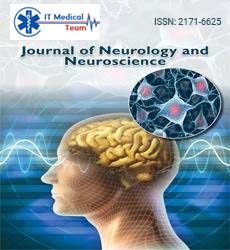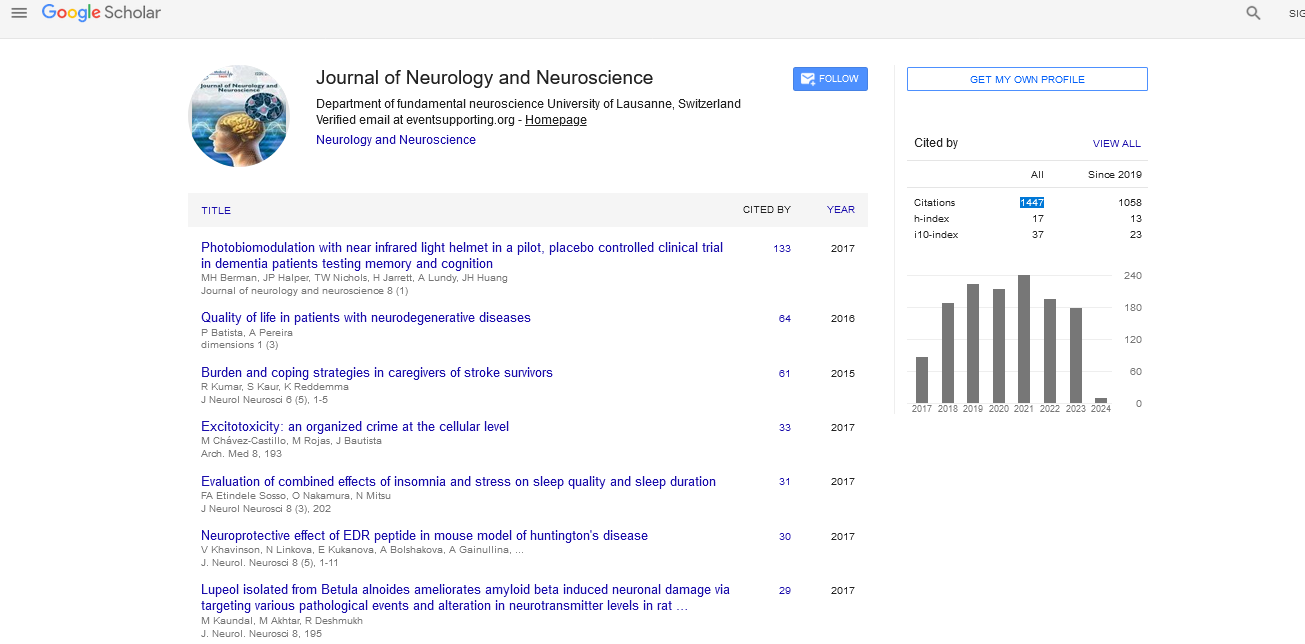Short Communication - (2024) Volume 15, Issue 5
Navigating the ethical landscape of neurotechnology implications for society
Elizabeth Davies*
Department of Neurosurgery, King’s College Hospital NHS Trust, Denmark Hill, London SE5 9RS, UK
*Correspondence:
Elizabeth Davies, Department of Neurosurgery, King’s College Hospital NHS Trust, Denmark Hill, London SE5 9RS,
UK,
Email:
Received: 03-Oct-2024, Manuscript No. ipjnn-24-15391;
Editor assigned: 05-Oct-2024, Pre QC No. P-15391;
Reviewed: 18-Oct-2024, QC No. Q-15391;
Revised: 24-Oct-2024, Manuscript No. R-15391;
Published:
31-Oct-2024
Introduction
As neurotechnology advances, promising to enhance
our understanding of the brain and improve cognitive
functions, society stands at a crossroads. This burgeoning
field encompasses a range of applications, from Brain-
Computer Interfaces (BCIs) that allow for direct
communication between the brain and external devices
to neurostimulation techniques that can alter mood and
cognition. While the potential benefits are immenseranging
from treating neurological disorders to augmenting
human capabilities-the ethical implications are complex
and multifaceted. This article aims to explore these ethical
dilemmas, considering how they intersect with societal
values, individual rights, and the potential for inequality.
Techniques like fMRI and EEG that provide insights into
brain activity and disorders. While these technologies
promise to revolutionize healthcare and human capabilities,
they also pose significant ethical challenges that society
must navigate [1].
One of the primary ethical concerns surrounding
neurotechnology is the issue of informed consent. Patients
or users must fully understand what a technology entails
before agreeing to its use. Given the complexity of brain
function and the technology itself, achieving true informed
consent can be challenging. Moreover, neurotechnology
has the potential to manipulate thoughts, feelings, and
behaviors. This raises questions about autonomy-can we
claim that we are making free choices when our thoughts
can be influenced by technology? This is particularly
concerning in contexts where individuals may feel pressured
to use neuroenhancement tools to remain competitive in
their fields [2].
Neurotechnologies often rely on the collection and
analysis of sensitive neurological data. This information
could reveal not only medical conditions but also aspects
of a person's cognitive and emotional state. As such, there
is a pressing need to establish robust privacy protections to
prevent misuse of this data. Furthermore, the potential for
unauthorized access to neural data raises significant security
concerns. If neurodata falls into the wrong hands, it could
be used for manipulation, discrimination, or exploitation.
As with many technological advancements, there is a risk
that neurotechnology will exacerbate existing inequalities.
Access to cutting-edge neurotechnological treatments
may be limited to those who can afford them, leaving
marginalized populations without access to potentially lifesaving
interventions [3].
This disparity raises the question of whether society is
prepared to ensure equitable access to these technologies.
Policymakers must consider how to distribute
neurotechnological benefits fairly and prevent a new form
of societal division-between those who can enhance their
cognitive abilities and those who cannot. Neurotechnology
challenges traditional notions of identity and personhood.
If technology can alter our thoughts, feelings, or even
memories, what does this mean for our sense of self? The
capacity to enhance cognitive function could lead to a
redefinition of what it means to be "human."
Description
This ethical concern touches on philosophical questions
about the essence of personhood. If enhancements become
widespread, society may need to redefine standards for
human capability, potentially marginalizing those who
choose not to enhance themselves or cannot afford such
technologies. Given the rapid pace of neurotechnology
development, effective regulation is essential. However,
the regulatory landscape is often lagging behind
technological innovation. There is a risk that inadequate
regulations could lead to harmful practices or the misuse
of technology. Developing comprehensive policies that
balance innovation with ethical considerations is crucial.
This includes engaging with a wide range of stakeholders,
including ethicists, medical professionals, technologists,
and the public, to create a robust framework for ethical
neurotechnology use [4].
Cognitive enhancement through neurotechnology
raises specific ethical questions. For instance, the desire to
enhance cognitive abilities may lead to societal pressure to
conform to certain standards of performance. This could
exacerbate existing inequalities, as those with access to
neuroenhancements may gain a significant advantage over
others. Furthermore, the potential for enhancement raises
questions about authenticity and personal achievement. If
individuals can enhance their cognitive abilities artificially,
what does that mean for our understanding of hard
work, talent, and merit? Society must grapple with these
philosophical questions while considering the implications
of normalizing enhancement technologies [5].
The integration of neurotechnology into healthcare
has the potential to revolutionize treatment paradigms.
However, this also means that the ethical considerations
outlined above must be addressed within the medical
community. Healthcare providers will need training to
navigate the complexities of consent and the implications
of using neurotechnology on patients. As neurotechnology
becomes more common in clinical settings, issues of
accountability arise. For instance, if a device malfunctions
and causes harm, who is responsible? The manufacturer,
the healthcare provider, or the patient? Establishing clear
lines of responsibility will be vital in maintaining public
trust in these technologies. In educational settings,
neurotechnology could offer new tools for learning and
cognitive enhancement. However, this raises concerns about
equity. If some students have access to neuroenhancement
technologies while others do not, it could lead to an uneven
playing field. In the workplace, the use of neurotechnology
for cognitive enhancement may become a standard
expectation. This could create pressure on employees to use
such technologies to maintain competitiveness, potentially
infringing on personal autonomy and well-being.
The rise of neurotechnology challenges societal norms
and values around health, ability, and achievement. As
cognitive enhancements become more normalized, there
may be a cultural shift in how society views mental health,
intelligence, and even disability. This shift could foster
a more inclusive perspective, promoting acceptance of
diverse cognitive abilities. Conversely, it may also lead to
a stigmatization of those who cannot or choose not to
enhance their cognitive capabilities. Neurotechnology
could also be misused in ways that threaten individual rights
and freedoms. For example, governments or corporations
may seek to employ neurotechnological interventions
for surveillance or social control, raising concerns about
dystopian outcomes. The ethical framework guiding
neurotechnology must consider these potential abuses,
emphasizing the importance of safeguards to protect
individual rights.
Conclusion
Navigating the ethical landscape of neurotechnology
is a complex endeavor that requires careful consideration
of a multitude of factors. From consent and privacy to
equity and identity, the implications of these technologies
extend far beyond the laboratory or clinical setting. As we
forge ahead into this uncharted territory, it is imperative
that society engages in robust dialogue about the ethical
dimensions of neurotechnology. Collaboration between
technologists, ethicists, healthcare professionals, and
policymakers will be essential to ensure that the development
and implementation of neurotechnology align with
societal values and ethical principles. By prioritizing equity,
privacy, and individual rights, we can harness the benefits
of neurotechnology while minimizing its potential harms,
ultimately shaping a future that is inclusive, responsible,
and reflective of our shared human dignity.
Acknowledgement
None.
Conflict of Interest
None.
References
- Ziegler D, Rathmann W, Dickhaus T, et al. Prevalence of polyneuropathy in pre-diabetes and diabetes is associated with abdominal obesity and macroangiopathy: the MONICA/KORA Augsburg Surveys S2 and S3. Diabetes Care. 2008; 31(3):464-469
Google Scholar, Crossref, Indexed at
- H Ferreira-Vieira T, M Guimaraes I, R Silva F, et al. Alzheimer's disease: targeting the cholinergic system. Curr Neuropharmacol. 2016; 14(1):101-115.
Google Scholar, Crossref, Indexed at
- Raj K, Gupta GD, Singh S. l-Theanine ameliorates motor deficit, mitochondrial dysfunction, and neurodegeneration against chronic tramadol induced rats model of Parkinson’s disease. Drug Chem Toxicol. 2022; 45(5):2097-2108.
Google Scholar, Crossref, Indexed at
- Ogurtsova K, da Rocha Fernandes JD, Huang Y, et al. IDF Diabetes Atlas: Global estimates for the prevalence of diabetes for 2015 and 2040. Diabetes Res Clin Pract. 2017; 128:40-50.
Google Scholar, Crossref, Indexed at
- Singh N, Armstrong DG, Lipsky BA. Preventing foot ulcers in patients with diabetes. Jama. 2005; 293(2):217-228.
Google Scholar, Crossref, Indexed at





